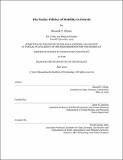The Scalar Politics of Mobility in Detroit
Author(s)
Glynn, Russell T.
DownloadThesis PDF (15.14Mb)
Advisor
Jackson, Jason B.
Terms of use
Metadata
Show full item recordAbstract
Over roughly the last decade, scholars and practitioners have recognized a so-called “new mobility” revolution associated with automated vehicle technologies, data-hungry platform firms (e.g., Uber), and international circuits of venture capital. Importantly, this period of evolution in the political economy of transportation is accompanied by, and in part reflects, a broader realignment in capitalist urbanization. Where industrial capital once fixed to regions of the global north in order to stoke systems of mass production, today the economic fortunes of these regions are tied to a knowledge economy in which urban space yields precious innovation and greases the wheels of consumption. This thesis explores questions of social and technological change in mobility and, by doing so, considers how movement figures in the concepts, frameworks, and theories scholars use to understand the spatial arrangement of capitalism. According to one perspective in the geography literature, spatial scales – the nested hierarchies of city, region, and nation that order the world – are an outcome of capital’s uneven development of space. An enduring task of human geographers is to understand how particular scales are constituted and transformed amid changes in sociospatial relations. I position the emerging new mobility ecosystem as one such sociospatial change that presents a productive point of entry into scalar thinking. Building upon a critique of the literature for its relatively thin conceptualization of transportation technologies and institutions within the production of spatial scale, I develop a scalar politics of mobility around an extended case study of Detroit. In doing so, I reveal the critical role of mobility in shaping scaling processes during the highway building era of the twentieth century and in the present new mobility moment.
Date issued
2021-06Department
Massachusetts Institute of Technology. Institute for Data, Systems, and SocietyPublisher
Massachusetts Institute of Technology